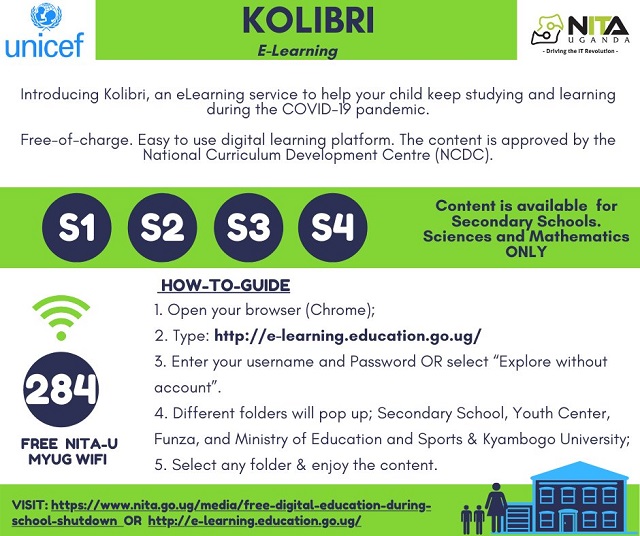
Kampala, Uganda | THE INDEPENDENT | A new digital learning tool has been unveiled to keep children learning from the comfort of their homes in the wake of coronavirus disease.
The platform named Kolibri, has been enriched with content approved by the National Curriculum Development Centre (NCDC) in Science and Mathematics for Secondary School learners and Inclusive education for primary school learners.
It comes a week after the Ugandan government ordered the closure of schools across the country amid the COVID-19 threat. So far up to 14 people have tested positive to the virus in Uganda. The virus which has spread to 195 countries has claimed more than 200,000 lives.
To access Kolibri one, will need internet connectivity and gadgets such as a desk computer, laptop or smartphone to access content through http://e-learning.education.go.ug. Through the chrome browser, every user is required to create an account with a username and password to have access to the platform which is championed by UNICEF, the Ministry of Education and the National Information Technology Authority.
The agencies are also exploring the use of existing radio-based learning materials to support the continued learning of the vast majority of children who would want to access Kolibri but do not have the required gadgets or are limited by the lack of electricity.
“Schools in the majority of countries worldwide have closed. It is an unprecedented situation and unless we collectively act now to protect children’s education, societies and economies will feel the burden long after we’ve beaten COVID-19. In the most vulnerable communities, the impact will span generations,” said Robert Jenkins, UNICEF Global Chief of Education.
Meanwhile, UNICEF Executive Director Henrietta Fore says the UN children’s agency is concerned that keeping children out of school is likely to have far-reaching effects on their well being. She adds that UNICEF is scaling up its response to ensure that children are given alternative ways to learn.
To help curb the disruption to children’s education and keep children learning safely, UNICEF has allocated additional funding to accelerate work with governments and partners in more than 145 low- and middle-income countries.
The initial global allocation of USD 13 million – nearly USD 9 million of which is from a contribution made by the Global Partnership for Education – will be catalytic by supporting national governments and a wide range of education partners in each country to develop plans to enable a rapid, system-wide response.
The initiative will enable countries to prepare alternative learning programmes in the case of school closures and help schools to keep children and their communities safe by providing vital information on handwashing and other hygiene practices. The funds will also help support children’s mental health and prevent stigma and discrimination by encouraging students to avoid stereotypes when talking about the virus.
UNICEF will also support the Ministry of Education and Sports to design an accelerated learning programme that will benefit all children when schools reopen.
******
URN
 The Independent Uganda: You get the Truth we Pay the Price
The Independent Uganda: You get the Truth we Pay the Price





